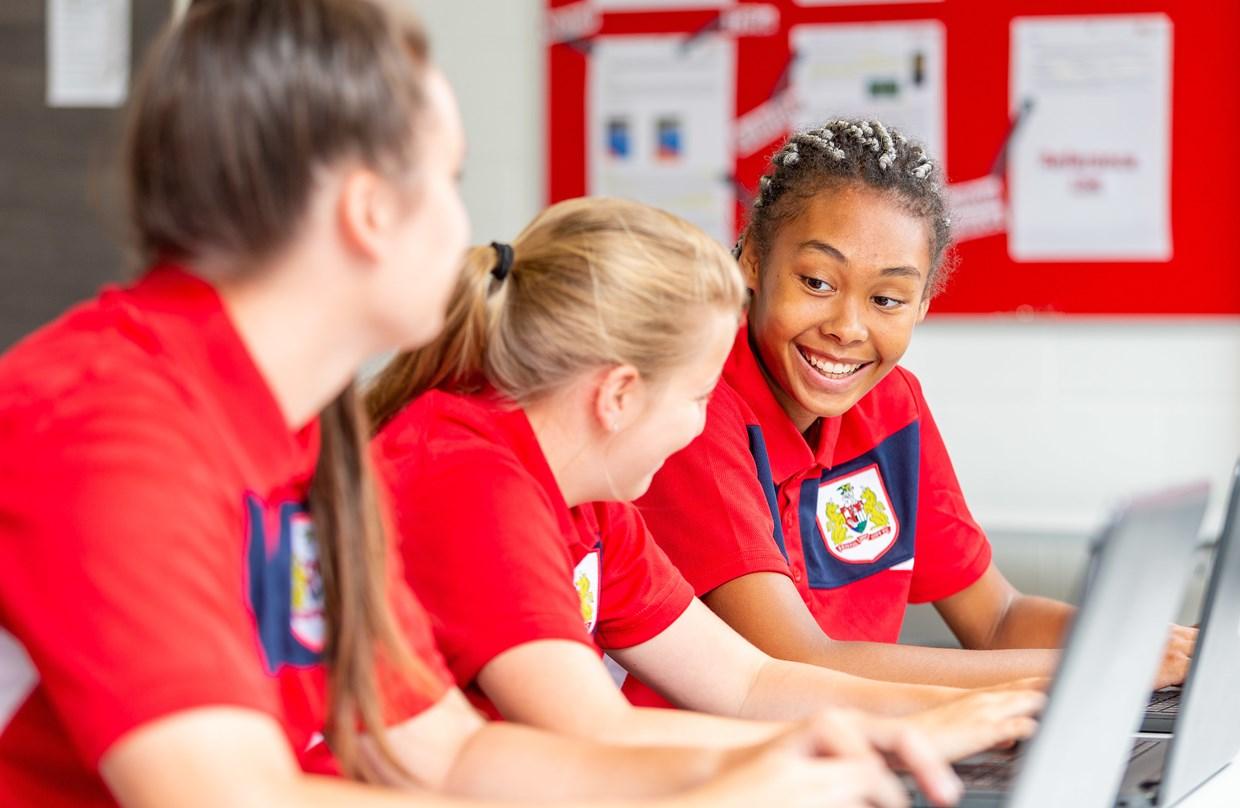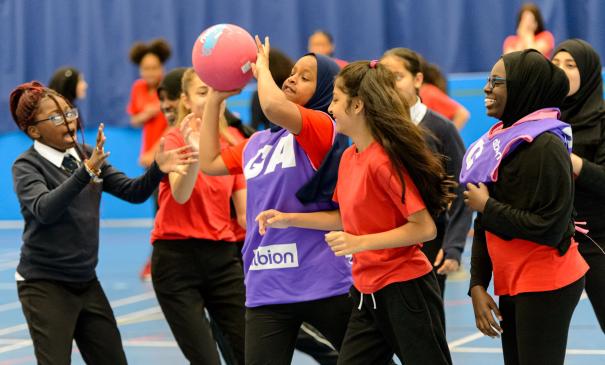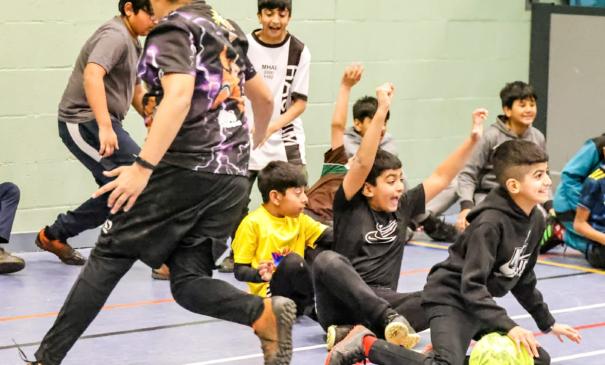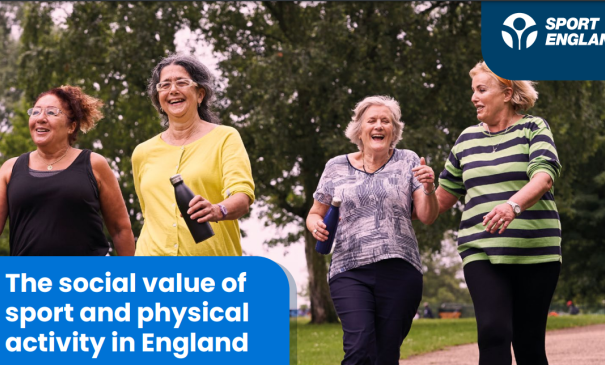Persistent school absences have increased significantly since the Covid-19 pandemic and were the subject of a recent Education Committee session in Parliament, at which Sport for Development Coalition member School of Hard Knocks gave evidence. 'Closing the gap in education and development' is a key outcome within the Coalition's #OpenGoal framework, so here we speak to five Coalition member organisations to explain how they are responding in schools and communities to this critical issue for Government and policy-makers.
School of Hard Knocks
School of Hard Knocks' mission is to empower individuals to fully realise their potential. Throughout 2023, the charity will work with 1787 pupils in 37 schools across England, Scotland and Wales which demonstrates a dramatic growth since the Covid-19 pandemic. The schools programme consists of two to three hours of a unique combination of rugby-based sessions, specialist mentoring and indoor group discussion. Combined with the stability and consistency of the relationships that staff build with young people, the charity enables participants to make positive changes to their behaviours, attitudes and mindset and gives them the ability to recognise their personal growth.
Director of Programmes Nathan Persaud explained: “We focus change on the five ‘Cs’: confidence, control, commitment, communication and cohesion. Sport in general is now acknowledged as an effective means of changing behaviour and developing life skills, but I feel there is something unique that rugby brings as an intervention of this type. When it comes to attendance, we know that for 20-25% of the pupils we see each week, our programmes has a huge impact – often with them only attending school because of us. If you look at the reasons behind that statistic, it’s because of the five ‘Cs’ – take ‘control’ for example. Part of the reason we use rugby is as a means of providing controlled confrontation, so pupils can practice techniques to control their emotions. This takes place in a positive, supportive environment with adults that they form healthy working relationships with. This may be at odds with their home lives and our staff often work with the child to explicitly make the connection between what they’ve learned within the rugby and how this may transfer to their home and school life.
"With regards to ‘communication’, our staff build rapport through rugby and close mentoring, we are able to help children more accurately describe their feelings, challenges and needs and get the support they need to thrive. And we understand ‘commitment’ as the level of effort put into something over time. We discuss that committing to the tackle means having a greater chance of success and being safer; versus being undecided or not fully committed and getting hurt. We then make this comparison to other areas of participants’ lives – school, work, family, education, career goals. We may gently challenge and question how committed participants are to the things they say they want and whether they are demonstrating this commitment within their actions.” Bringing all of these elements together explains how, across 2022, 73% of participants improved their cohesion, and 53% improved their confidence, control, communication and commitment.
Read more at schoolofhardknocks.org.uk
Football Beyond Borders
Football Beyond Borders is an education and social inclusion charity which supports the most vulnerable young people to thrive in mainstream education. Its work has been profiled on BBC Sounds (episodes five and six) and BBC Panorama as a potential solution to persistent absenteeism. James Reeves, Senior Press & Advocacy Manager, explained: “Our focus is on using sport - in our case, football - to help young people build great relationships with trusted adults and their peers, formed by shared experiences and longevity. Teachers often can’t create these conditions with young people for reasons outside of their control. Teenagers' brains are hyper-sensitive to peer approval, so long-term mutual connection is required for great relationships to thrive. In many ways, competitive sport can be an issue for this, but with an expert workforce who understand the emotional, relational and embodied nature of learning and the way sport complements these aspects we can improve support for young people.”
James added: “More than one in five students are missing half a day or more per week of school, which reduces levels of attainment and mental wellbeing, and if young people aren’t in school, it's harder for them to be referred to support services or pastoral teams. As well as long-term illness, persistent absence for unauthorised other reasons (PAUO) has increased, and we know the risk factors for students who are likely to be PAUO are linked to high numbers of suspensions, attending Alternative Provision, experience of social care and eligibility for free school meals.

"Early-intervention programmes across the Coalition offer one solution but, at Football Beyond Borders, we believe more focus is needed to help close gaps in education and development. Programmes should combine sport and physical activity with expert staff trained in cultural sensitivity, trauma and ACEs to enable staff to nurture authentic relationships with young people, families, carers and teaching staff. This builds bridges between school and home and can drive attendance and communication. We must ask ourselves, what is the role of school in young people’s lives after the pandemic? Some education professionals are now referring to schools as the ‘fourth emergency service’. We know that young people receiving free school meals are far more likely to be persistently absent than their peers in every age group. School needs to be a place where young people feel safety and a sense of belonging, particularly for the most vulnerable students.”
Read more at footballbeyondborders.org
Youth Sport Trust
A review of Youth Sport Trust’s projects in 2022 showed that 50% of practitioners reported the charity’s programme had a ‘positive’ (41%) or ‘very positive’ (9%) impact on young people’s attendance at school. Head of Sport Vicci Wells explained: “The Youth Sport Trust believes that encouraging participation in PE, sport and physical activity provides a mechanism to increase engagement with education, especially in disadvantaged and deprived areas. This is vital if we are to address the current crisis in attendance, with rising absenteeism jeopardising young people’s future educational and employment opportunities.”
She added: “Our experience shows that putting PE, sport and play at the heart of schools creates a more positive and engaging school environment. The uniqueness of this environment can lead to different relationships between staff and pupils being formed, often side by side; shoulder to shoulder. This can result in positive engagement and enhance pupils’ sense of belonging in and about their school. Empowering young people with opportunities to be active - and have fun - improves physical and mental wellbeing, which can increase motivation and engagement in the classroom.”

The Youth Sport Trust recently published its annual report for PE and school sport, which outlines the issues facing young people and the current state of PE, sport and play in schools. Vicci explained: “Taking part can also aid the development of skills such as teamwork, communication and leadership. Not only do these improve social connectedness and increase a pupil’s desire to attend school regularly, but they can also be beneficial for future opportunities in life. Progress in this area requires a joined-up approach to policy making across different departments, alongside co-ordinated activity to raise awareness of the innovative approaches being developed and implemented, so that schools can tailor best practice from elsewhere to meet their own local needs. An example is The Prescot School in Knowsley, where faced with higher than average levels of persistent absenteeism, it is thinking differently about how they engage with their community and families; with sport, and additional wellbeing approaches being explored as levers. In addition, policy development in this area needs to be informed by engagement with young people, who are best placed to identify the barriers to attendance and how these can be overcome.”
Read more at youthsporttrust.org
Dallaglio Rugby Works
Phil Hannah is Head of Delivery & Partnerships at Dallaglio Rugby Works, the charity that works with young people aged 12 to 18 years old who are experiencing school exclusion to help support them in realising their full potential for the future. He commented: “Over the past year, attainment gaps have also widened, and disadvantaged students do not receive the same level of skills training and financial literacy as their peers from mainstream and independent schools. Low levels of attendance can lead to school exclusion and unfortunately there is a clear link between school exclusion and custodial sentences with 63% of the prison population having experienced school exclusion at some point.
"A specific focus of ‘RugbyWorks Term Time’ is to increase the attainment levels of our young people, this includes increasing their overall attendance within school. We know 71% of school leaders observed that for at least half the students on the RugbyWorks programme, attendance had improved across the whole school not just within RugbyWorks sessions; furthermore 74% of school leaders agree that at least half of the students had experienced an increase level of overall attainment due to being part of the RugbyWorks programme. This importance of this can't be overstated, there are clear undeniable links between attendance levels and overall attainment/achievement within school, persistent school absences have risen steadily since 2016/17 and now sit at 24.2%.
Phil explained: “The success of our programmes relies on the development of trusted adult relationships between our staff and participants, this doesn’t happen quickly and takes a lot of time. We work with young people over a period of years to build that trust. It is helped by the fact that we offer something different to standardised education and our sessions involve developing life skills through the vehicle of sport, more specifically through rugby. We find that the dynamic of our coaches and mentors being seen through a different lens to teachers and other professional agencies in young people’s lives allows us the opportunity to develop strong relationships that then enable the young people to enact positive change in their own lives.” He added: “The use of sport as a vehicle to deliver these key life lessons is vital. In some cases it’s ‘education by stealth’ and represents an accessible way to learn for young people that have been excluded in the first place and have potentially struggled with traditional learning environments.”
Read more at dallagliorugbyworks.com
EFL Trust
The EFL Trust is the charitable arm of the EFL (English Football League) and helps to oversee the 72 Community Club Organisations associated with EFL Clubs. Its National Development Manager Louise Williams explained how the EFL Trust is playing its role in preventing absences. “Our school-based interventions are delivered by coaches associated with the local professional football club which automatically builds a relationship with the young people and provides a relatable role model for them,” she said. “On our programmes, we see an enormous amount of engagement from pupils, particularly those who often struggle with concentration in class. The interventions combine physical activity and play to ensure that they are inclusive to all. The fun environment that can be created through physical activity gives the young people a release, whilst at the same enabling the coaches to have positive conversations to provide an educational aspect to the interactions. Many of our professional Football Clubs are located within the most deprived areas of the country and act as anchor institutions within these areas. The children living within these areas have an existing affiliation to these Clubs and as such find it easy to trust our coaches. Feedback from teachers has shown that following the physical activity sessions, pupils are more engaged and look forward to being in school on these days.”

Louise explains that extended absences from schools can link, or lead to a series of issues. “As well as falling behind academically, young people not attending school run the risk of getting involved in challenging behaviours. Sport and physical activity provides structure, social interaction and something for them to focus on.” With its three core themes of ‘education and employability’, ‘health and wellbeing’ and ‘participation and community engagement’, the EFL Trust has been a key partner in co-designing and supporting the Coalition’s #OpenGoal framework and Louise added: “I think that the Coalition should play a lobbying role in ensuring that sport and physical education is a pivotal part of the school day, outside of PE.”
Read more at efltrust.com
Education Committee: Persistent absence and support for disadvantaged pupils



